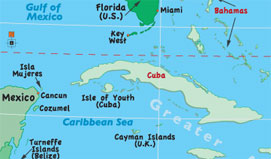On October 16, the Cuban government made good on an old, until-now unrealized promise to its own citizens: Effective January 14, 2013, they will scrap the requirement that Cuban citizens obtain exit permits before they are allowed to travel outside the country.

The exit permit system was put in place by the Communists long ago as a method of control. Under the rule, Cuban citizens were obliged not only to procure passports and visas for the country or countries to which they intended to travel — once these were obtained, they then also had to obtain an exit permit from the Cuban immigration service. No exit permit, no travel. What is more, the permits were time-certain; stay outside the country beyond the time authorized, and there was no assurance at all that they would allow you to return. And if they did, you might be subject to jail or other penalties for violating the permit.
It is certainly a sign of progress, although there are at least some indications that the government's hope is that it will result in an increase in precious dollars and other stable currencies sorely needed in the failed economy of a desperately poor country with a crumbling infrastructure. And according to reports, Cuba will continue to exercise "brain drain" controls over certain professionals, such as doctors, by inhibiting their travel to ensure that they don't permanently depart under the guise of a "visit" to waiting relatives abroad.
What does all of this mean for the United States? Under generally liberal U.S. rules in place specifically for Cubans, if they touch land here, they are permitted to stay — usually in an immigration parole status — and one year later the Cuban Adjustment Act kicks in and these persons are authorized by law to apply for green cards. Under these circumstances, the American public will, reasonably enough, be asking if we can expect a kind of airborne Mariel to occur as the exit travel restrictions for Cubans are substantially eased.
Well, not to worry — at least, if we are to believe the selective public relations spin that is already ginning up inside our own borders (a common phenomenon where the tinderbox subject of immigration is concerned). According to an Associated Press article, "Kathleen Campbell Walker, an immigration lawyer in El Paso, Texas, said Cubans who fly to the United States are still required to get a State Department-issued visa. Homeland Security officials who review passenger lists for U.S.-bound flights are likely to order an airline to deny boarding to anyone who doesn't have that permission."
A State Department spokeswoman, Victoria Nuland, is quoted as saying "Our own visa requirements remain unchanged … . We obviously welcome any reforms that'll allow Cubans to depart from and return to their country freely. We remain committed to the migration accords under which our two countries support and promote safe, legal, and orderly migration."
So, we have an immigration lawyer (hardly unbiased in the matter of migration to the United States) and the State Department telling us not to worry because Cubans can't get here without visas from American consular officials. Really? Maybe we can tell that to the millions of illegal aliens from dozens of countries who are already here because they surreptitiously crossed the border without visas — and they will leave on their own, go home, and show up at an American Embassy abroad to pick up that sadly lacking trifle.
Here's the thing: Both Mexico and Canada already have normal diplomatic relations with Cuba. They have for years and years; we are the exception in the community of nations. Cubans can simply obtain visas from either of those countries, fly there, make their way to the U.S. border and then cross surreptitiously. Once in, all they need do is show up at any of the Homeland Security agencies charged with immigration administration (Citizenship and Immigration Services; Customs and Border Protection; or Immigration and Customs Enforcement), turn themselves in, get processed, paroled, let that ole clock tick until their year is up, and hallelujah!, it's green card time.
Our borders with both of those countries, as is very well known, are long and porous: nearly 4,000 miles of northern border with Canada (not counting the Canada-Alaska line) and nearly 2,000 miles of southern border with Mexico. How liberal will Canadian or Mexican consular officials be in handing out visas? Well, let's face it, even if they suspect that the applicant plans to sneak into the United States, they don't really have a dog in that fight, do they?
And when it comes right down to it, Cubans won't even need to fly — there are plenty of affordable ways for cash-strapped Cubans to travel by boat across the small strip of Caribbean ocean that separates Cuba from Mexico's Yucatan peninsula. A quick glance at the map shows exactly how close it is.
So, depending on whether or not the Cuban government is playing a shell game (for instance by eliminating exit permits, but making it difficult to obtain passports), expect the numbers of Cubans paroled into the United States to rise over the course of this coming calendar year — and for the number of applicants for permanent residence under the Cuban Adjustment Act to grow the year after that. It's just a combination of simple geography and complex, special-interest immigration law.
